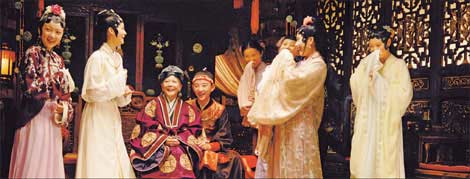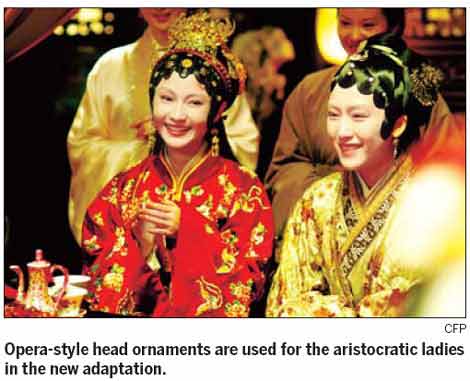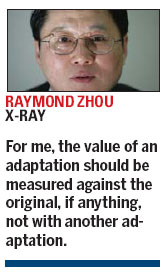
The new television adaptation of A Dream of Red Mansions has a lavish look, with elaborate sets, props and costumes. CFP

A new television adaptation of a literary classic is sending many into a spiral of discomfort. But Raymond Zhou defends it as a worthwhile attempt at a faithful recreation.
It is not easy being a champion of an unpopular cause.
I'm talking about the latest television adaptation of A Dream of Red Mansions.
As the 50-episode series rolls out across the nation, it has met with an avalanche of bad press. Most people seem to hate it, yet the ratings are quite high. It appears people are watching something they love to hate.
That puts me into what seems like a small minority. I truly love this version - to the point I'm willing to defend it.
There is no disagreement about the value of the original novel, which is universally considered the crowning achievement of Chinese fiction. Variously translated as A Dream of the Red Chamber or The Story of the Stone, this 18-century classic presents a panorama of Chinese society with a depth and breadth rarely seen in Chinese literature. A special field of study is devoted to it, called Redology.

Now, I'm far from being a Redologist. I have read the original and I have probably watched more film and television adaptations than most - 16 versions in all, to be exact. That still does not turn me into an expert, but it does allow me to distance myself from the nationwide affinity with one particular treatment.
Most people who hate the new version cite the fact that it is different from the 1987 TV series, which is constantly on air and has become something of a classic in itself. For me, the value of an adaptation should be measured against the original, if anything, not with another adaptation. An artist has the right to interpret a classic based on his or her own understanding. You may not like it, but you cannot deny him or her that right.
When Laurence Olivier made Hamlet in 1948, it was hailed as a masterpiece on screen. But that did not mean latecomers could not film their own versions. While it is hard to say Kenneth Branagh's version in 1996 or Franco Zeffirelli's, starring Mel Gibson and Glen Close, among dozens of remakes, is better, each has its own strengths - and, of course, weaknesses. Each artist and each era can bring something fresh to an old chestnut. If an adaptation is so awful it does not have any merit, it will wither by the roadside and never have a chance of dimming the glory of the original book.
Li Shaohong, director of the current series, is a serious filmmaker with a feminine touch. She is the first one to put "dream" into A Dream of Red Mansions. The eerie music and the uneven pacing of sequences are subtle hints of the nature of the story. She also restores the framework of the mammoth work that actually constitutes its philosophical and religious underpinnings. In most other versions, the prelude with a Buddhist and a Taoist monk is discarded as superstition.
Many in the audience find Li's lines, including voiceover, very awkward because they are accustomed to the simplified dialogues of the early series. The current one sticks mostly to the words in the book and retains words whose meanings have changed. It is perhaps an understatement to say one needs at least a high school diploma to get what the characters are saying, and perhaps a college diploma to get the nuances behind the words.
One obvious advance over past treatments is the lavish look, with sets, props and costumes so elaborate they scream 18th-century Chinese aristocracy. It can be made only now and in the Chinese mainland. The popular early version has traces of that era when China was still reeling from the destruction of the "cultural revolution" (1966-76). And Hong Kong and Taiwan treatments have telltale signs of a tight budget, which is natural for private business operations.
But the Li Shaohong version has its quirks, or as many will insist, its inadequacies. First under attack is the makeup, which uses an opera-style head ornament for the aristocratic ladies. For me, it meant a harder time telling the numerous roles apart, especially for the opening episodes.
Then comes the cast. The biggest asset of the 1987 version was its cast, especially the principal roles, who were selected from all walks of life and possessed a striking resemblance to the depictions in the novel. The new version was preceded by a television contest show, yet the choices are uneven. Some main roles are divided into two parts, one for the early teen years and the other, for a few years older. Take Baoyu, the male lead. He is around 12 or 13 when the story unfurls. He often gets into his mother's or grandmother's embrace, yet his budding romance and his sexual blooming drive much of the plot. How can one actor be young enough to make everything about him innocent, yet old enough to convey the sexual undertones of the story?
That said, there is some glaring miscasting - Qin Zhong, another boy with the charm of Adonis, has to be so androgynously good-looking he changes the dynamics of a class full of nominally heterosexual boys. But the actor in this role would not turn any head. One major controversy centers on the death scene of the female lead, Daiyu. Other actresses have all "died" like Violetta in La Traviata, collapsing in consumption, but this one is seen with her body being washed by her maid and, when her grandmother calls, has only a thin veil covering her naked body.
"How can such a symbol of purity be shown almost naked?" many protest.
First of all, the scene of washing her dead body is from the original novel. Second, the suggestion of nudity, very tastefully done and with no improper exposure whatsoever, is consistent with the clues hidden in the story. Daiyu's most famous scene is that of her burying flower petals in the garden, an expression of her pessimism and gloomy disposition, and also a figurative rehearsal of her own burial. One of the lines from her poem from that scene goes "They arrive pure and depart pure". Another line from Baoyu is less poetic, but speaks of the same thing: "One comes to this world and leaves it naked." Here, nudity signifies purity.
But to the mass audience in China, nudity equals lewdness. In a sense, one has to sacrifice something in adapting a work of such complexity. This is China's Hamlet - in four big tomes. Experts have been arguing for a century about the hidden meaning of many details. The shortcut to screen success is to cheapen it to just another family melodrama. Almost all earlier adaptations are just that, mostly a love triangle. Li Shaohong wanted to do more and has thus offended public sensibility.
For me, no single adaptation is definitive. One actor may be better at a certain role than others, and one approach more interesting. Just like Western classics, or for that matter, classical music, a great work - of literature or music - will spawn endless interpretations. Only the original is definitive. Everything else is just another artist's interpretation.
If you are not satisfied, go back to the book or the score.
raymondzhou@chinadaily.com.cn
相关阅读:
(作者周黎明 中国日报网英语点津 编辑陈丹妮)
